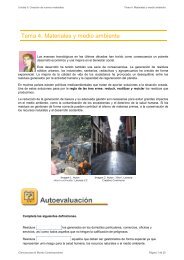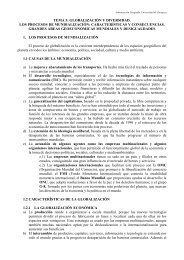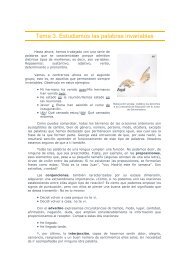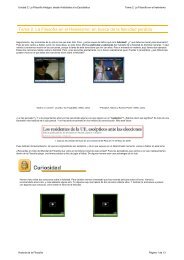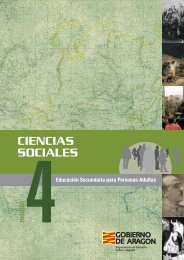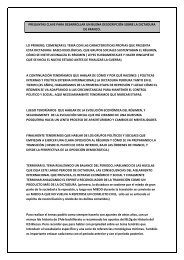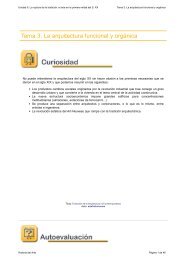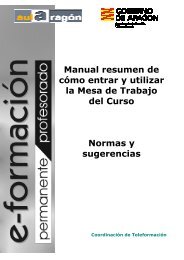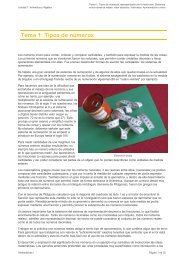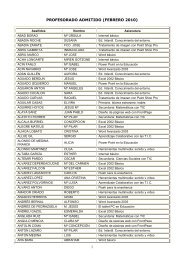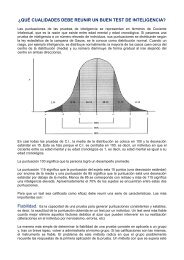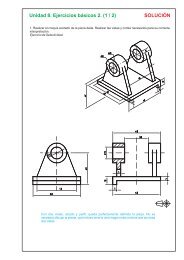Educación Secundaria para Personas Adultas 2módulo - aulAragon
Educación Secundaria para Personas Adultas 2módulo - aulAragon
Educación Secundaria para Personas Adultas 2módulo - aulAragon
You also want an ePaper? Increase the reach of your titles
YUMPU automatically turns print PDFs into web optimized ePapers that Google loves.
INGLÉS<br />
● MUSTN'T<br />
Mustn't expresa prohibición – algo que no está permitido:<br />
Clients mustn't leave bicycles here Los clientes no deben dejar las bicicletas aquí<br />
We mustn't use the mobile at school No debemos usar los móbiles en el colegio<br />
IMPORTANT<br />
– MUST es un verbo auxiliar modal, por lo tanto:<br />
Sólo tiene una forma <strong>para</strong> todas las personas. No tiene otro tiempo verbal tampoco (MUST).<br />
Siempre va seguido de un infinitivo sin TO<br />
You mustn't smoke<br />
No debes fumar<br />
You must fasten your seat belt Tienes que atarte el cinturón<br />
● HAVE TO / HAS TO – TENER QUE<br />
Have to / Has to: tener que<br />
Don't / Doesn't have to: no es obligatorio o necesario<br />
AFIRMATIVA<br />
NEGATIVA<br />
I/you have to tengo/tienes que I/you don't have to no tengo/tienes que<br />
He/she/it has to tiene que He/she/it doesn't have to no tiene que<br />
We/you/they have to tenemos/tenéis/tienen que We/you/they don't have to no tenemos ...que<br />
INTERROGATIVE<br />
Do I/you have to ¿Tengo/tienes que ...?<br />
Does s/he/it have to ¿Tiene que ...?<br />
Do we/you/they have to ¿Tenemos ... que?<br />
IMPORTANT<br />
• La forma afirmativa expresa obligación: tener que hacer algo:<br />
I have to get up early<br />
tengo que levantarme temprano<br />
• La forma negativa expresa ausencia de obligación: no ser necesario hacer algo:<br />
I don't have to get up early No hace falta/no es necesario que me levante pronto<br />
Have to / Has to (3ª persona del singular): también se usa como MUST <strong>para</strong> expresar obligacion:<br />
Jane has to work on Saturdays Jane tiene que trabajar los sábados<br />
I have to finish typing these reports for my boss<br />
Tengo que acabar de pasar al ordenador estos informes <strong>para</strong> mi jefe<br />
● DON'T / DOESN'T HAVE TO<br />
La forma negativa de have to significa que no es obligatorio o necesario hacer algo.<br />
I don't have to get up early tomorrow. It is Sunday<br />
No tengo que levantarme pronto mañana. Es domingo<br />
You don't have to do the shopping. We have a lot of food<br />
No hace falta que hagas la compra. Tenemos mucha comida<br />
COMPARE: You mustn't use the phone in the office (It is prohibited) -<br />
No debes usar el teléfono en la oficina (está prohibido)<br />
You don't have to finish this report now. (It is not necessary)<br />
No hace falta que acabes este informe ahora. (No es necesario)<br />
[ 154 ] Módulo 2



